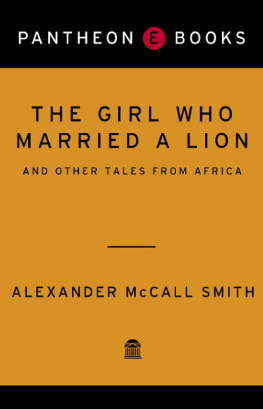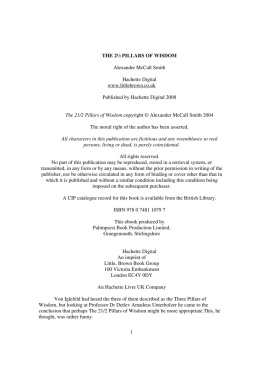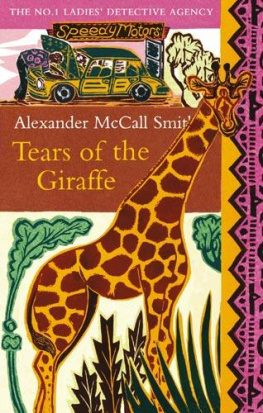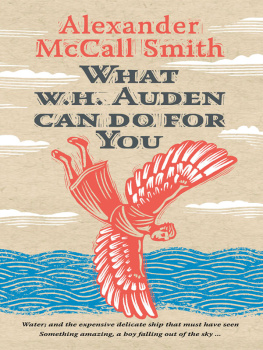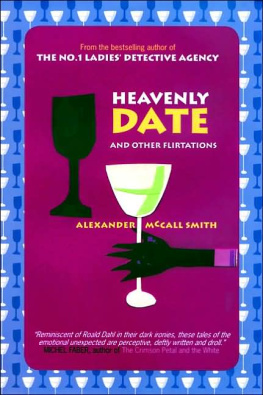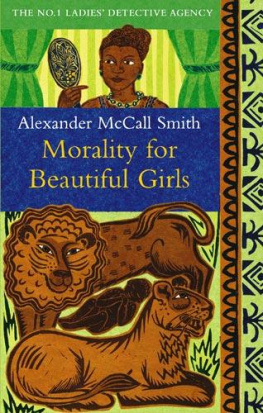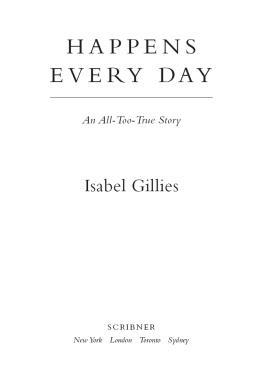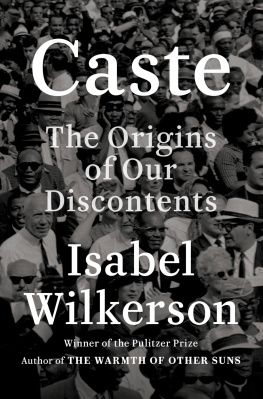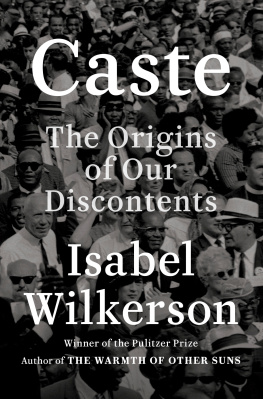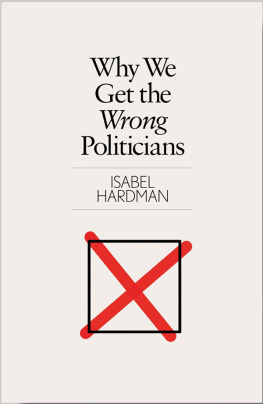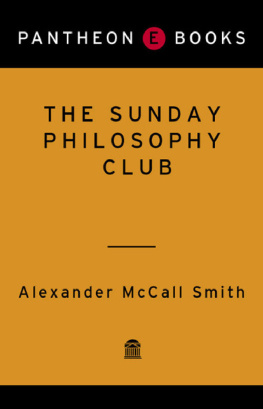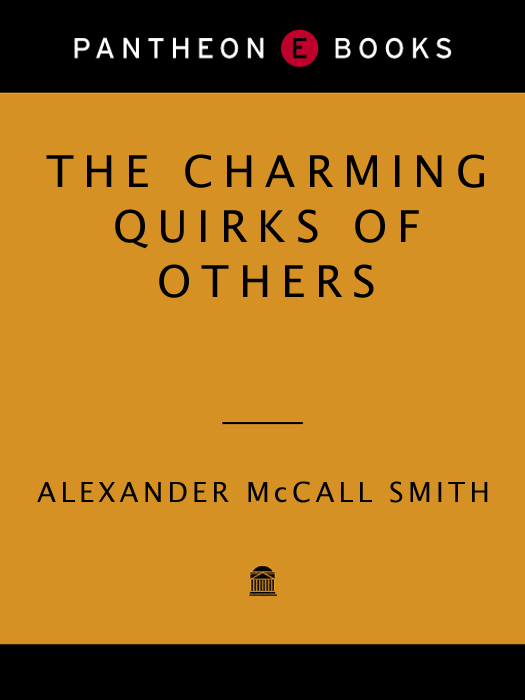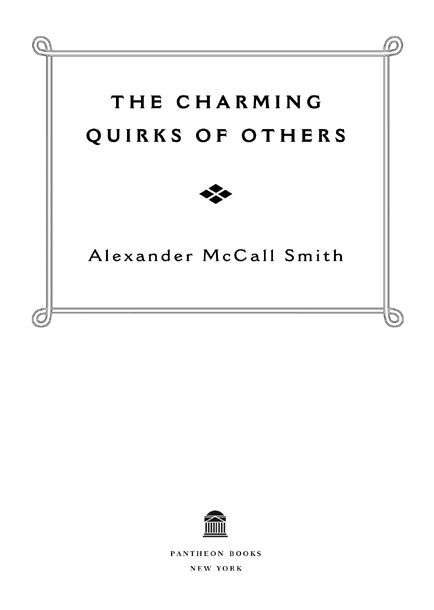BOOKS BY ALEXANDER M C CALL SMITH
IN THE ISABEL DALHOUSIE SERIES
The Sunday Philosophy Club
Friends, Lovers, Chocolate
The Right Attitude to Rain
The Careful Use of Compliments
The Comforts of a Muddy Saturday
The Lost Art of Gratitude
The Charming Quirks of Others
IN THE NO. 1 LADIES DETECTIVE AGENCY SERIES
The No. 1 Ladies Detective Agency
Tears of the Giraffe
Morality for Beautiful Girls
The Kalahari Typing School for Men
The Full Cupboard of Life
In the Company of Cheerful Ladies
Blue Shoes and Happiness
The Good Husband of Zebra Drive
The Miracle at Speedy Motors
Tea Time for the Traditionally Built
The Double Comfort Safari Club
IN THE PORTUGUESE IRREGULAR VERBS SERIES
Portuguese Irregular Verbs
The Finer Points of Sausage Dogs
At the Villa of Reduced Circumstances
IN THE 44 SCOTLAND STREET SERIES
44 Scotland Street
Espresso Tales
Love over Scotland
The World According to Bertie
The Unbearable Lightness of Scones
The Girl Who Married a Lion and Other Tales from Africa
Las Orchestra Saves the World
Corduroy Mansions
This is a work of fiction. Names, characters, places, and incidents either are the product of the authors imagination or are used fictitiously. Any resemblance to actual persons, living or dead, events, or locales is entirely coincidental.
Copyright 2010 by Alexander McCall Smith
All rights reserved. Published in the United States by Pantheon Books, a division of Random House, Inc., New York. Originally published in Great Britain by Little, Brown, an imprint of the Little, Brown Book Group, a Hachette UK Company, London.
Pantheon Books and colophon are registered trademarks of Random House, Inc.
Excerpts from poems by W. H. Auden appear courtesy of Edward Mendelson, Executor of the Estate of W. H. Auden, and Random House, Inc.
Library of Congress Cataloging-in-Publication Data
McCall Smith, Alexander, [date]
The charming quirks of others / Alexander McCall Smith.
p. cm. (Sunday philosophy club 7)
eISBN: 978-0-307-37945-0
1. Dalhousie, Isabel (Fictitious character)Fiction. 2. Women philosophersFiction. 3. Edinburgh (Scotland)Fiction. I. Title.
PR6063.C326C47 2010 823.914dc22 2010028001
www.pantheonbooks.com
v3.1
This book is for Robin Straus, in gratitude
Contents
CHAPTER ONE

S ATURDAY EVENING, remarked Isabel Dalhousie. A time for the burning of ears.
Guy Peploe, seated opposite her in the back neuk at Glass & Thompsons caf, looked at her blankly. Isabel was given to making puzzling pronouncementshe knew that, and did not mindbut this one, he thought, was unusually Delphic.
He stirred his coffee. Im not quite with you, Isabel. Not quite. Burning ears?
She smiled. She had not intended to be opaque, and it was Guy, after all, who had brought up the subject of Saturday evenings; she was merely picking up on the theme. He had mentioned an opening he had attended last Saturday, a show featuring a Scottish realist painter who had been ignored in his lifetime but who was now lauded as a genius. Everybody had been there; which meant, he said with a laugh, everybody who went to Saturday-evening openings at galleries. The remaining four hundred and eighty thousand people who lived in Edinburgh and its immediate environs had presumably been doing something else.
That had triggered Isabels remark about burning ears, which she now went on to explain. What I meant is that on a Saturday evening, she said, there are always a number of dinner parties in Edinburgh. The same people go to dinner with the same people. Backwards and forwards. And what do they talk about on these occasions?
Those who arent there? suggested Guy.
Isabel agreed. Exactly. And there are certain people who are talked about a lot. This is not a particularly big pond, you know. In some ways its a village.
Guy nodded. All cities have their villages, he said. Even the big ones. London claims to be full of them. New York too.
But New York has a village, said Isabel. Its called the Village. Which is helpful, I suppose.
Guy laughed; Isabels wry comments, dropped as asides, could seem so arresting even if, when you analysed them, it was hard to say why: this was an example. There was nothing exceptional about what she had saidnot on the face of itbut the comment about helpfulness tripped one up.
Of course, Isabel continued, to use the definite article about ones village demonstrateshow should one put it?a good conceit of oneself. That clan chief called the MacGregor: Does he correct people who call him a MacGregor? Would he have to say No, the MacGregor, please?
Im sure he wouldnt, said Guy. People like that are usually very modest. If youve been on the go for five hundred years, youre usually fairly low-key about it.
Isabel thought that was quite true. She knew a Nobel laureate who referred to a little prize they were once kind enough to give metotally undeserved, of course. That took some doing, and some strength of character too; how many of us, she wondered, would hide a Nobel prize under our bushel? Her friend had heard the news, she remembered his telling her, through a message left on his telephone answering machine. This is the Nobel Committee in Stockholm and we are delighted to inform you that you have been awarded the Nobel Prize this year for
But there was something else to be said about MacGregors. You do know that their name was interdicted? she said. James the Sixth, Im afraid, reacted rather harshly to some bit of bad behaviour by the MacGregors and made their name illegal. Its an odd notion, dont you think? Making a name illegal. They had to start calling themselves things like Murray and so on.
Guy knew that. Isabel had spoken about it before; she often brought up the Stuarts, for some reason that completely escaped him. People had their historical enthusiasms, he supposed, and the Stuarts were not exactly a tedious dynasty. It might have been better, he thought, if they had been; better for them, that is.
Mind you, said Isabel, it has to be said that James the Sixth was a somewhat miserable piece of work. Ive tried to like the later Stuarts, you know, but I have to say its an effort. Charles the First was such a weak and self-indulged man, and by the time we get to Bonnie Prince Charlie the genes had gone pretty bad. James the Sixth, I suppose, was far brighter than most of them, but he must have been rather difficult company much of the time. Interesting, though: gay kings usually are.
Didnt he have a wretched childhood? said Guy. Thats sometimes an excuse, isnt it? The fact that one has had an awful time as a child can explain so much, cant it?
Isabel reached for her cup of coffee. Does it? I wonder. I think that theres a case for putting your early years behind you. Plenty of people have done that. They grow up and then draw a line.
Guy considered this. Yet the early years wont necessarily go away. If youre desperately unhappy when youre young, arent you damaged goods?
Isabel was prepared to concede this of James VI. He had that awful tutor, that Buchanan man, who intimidated him.


